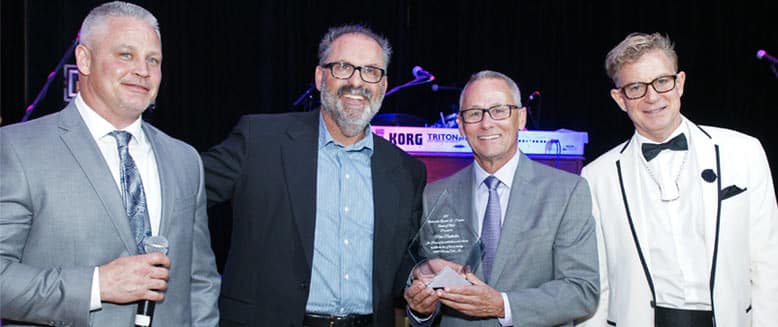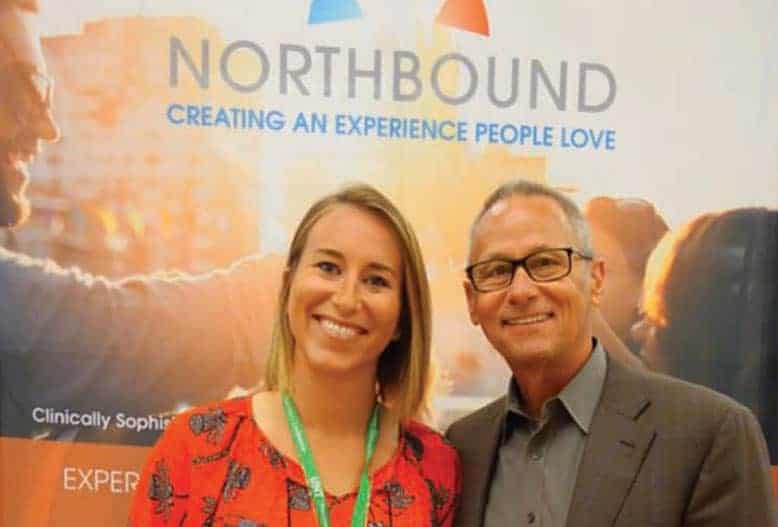How could he have imagined that getting sober would lead him to a meeting with the President of the United States and being part of transforming an industry?
Northbound is built upon a foundation of organizational health. These words can often be heard around Northbound, but where did they come from? And what do they mean? Personally having bounced from one toxic work environment to another in my previous career, I knew that there was something different about Northbound. When I interviewed for my job, I was brought in to meet our CEO, Mike Neatherton, as the final step of the hiring process. I liked him instantly; there was something calming about his presence, and he seemed genuinely interested in who I was as a person. We talked about my own recovery, and one of his first questions was, “What do you do to take care of yourself?” Well, that was different. The interview wasn’t just about what I could do for Northbound. He was trying to figure out whether it would be a mutually beneficial fit for both company and employee. This conversation made me realize that I didn’t just need this job, but I wanted it too. The treatment industry was new to me, so I had no idea with whom I was sitting. I didn’t know that this was a man who had spent 20 years running the day to day operations of the Betty Ford Center alongside Betty Ford herself. I didn’t know that this was a man with nearly four decades of sobriety, who had mastered the fine art of “balance,”and makes a daily effort to share his learned wisdom. I didn’t know that this was the man who brought the concept of organizational health to Northbound, a revolutionary idea to someone like me who had only ever worked in a series of toxic environments. And I certainly didn’t know that I was about to start working for someone who would inspire me every day to put my heart into everything that I do. Mike Neatherton is a leader who not only leads by example with courage and vulnerability, but also encourages us to strive for spiritual and emotional health in every aspect of our lives.
Self-care. What a concept! We’ve all been told to practice self-care and be kind to ourselves, but it’s so easy to lose sight of what that actually looks like. When Mike meets someone who is struggling in sobriety, he encourages them to think about what’s really important in their lives, and to begin creating a list of priorities. In the rooms of Alcoholics Anonymous (and other twelve step programs), it is often said that whatever you put before your sobriety is the first thing that you’ll lose. Job, relationship, children, money – whatever floats to the top of your priority list stays there on borrowed time, because losing sight of sobriety is a fast ticket to losing it all. We’ve seen it happen time and time again. It’s heartbreaking to watch. And it’s something that I consistently check within myself. So when Mike talks about his own list of priorities, he has my attention. His list is something that he created early in recovery. He’s clutched onto it for 37 years, and has continued to ask others to do the same. Sobriety is at the top of his list, of course, but he doesn’t stop there. Next comes his higher power, then all aspects of his health, followed by his marriage. Mike likes to point out here that his wife (of 35-years) Maria, is well aware that she is #4 on the list, and she’s happy to be right there. “Without the first three, I wouldn’t be married,” he states with a smile. Number five is his three daughters, the loves of his life. Sixth is, as Mike describes, his “go-to-guys,” men he has no secrets from and who love him unconditionally; and seventh is his family of origin. The next and final two caught me off guard. Eight is his job, and the final spot, nine, is the financial security that his job allows him to provide for his family. For a recovering workaholic like myself, placing work near the bottom of the list feels counter-intuitive, and yet so seemingly obvious. I spent years living to work, but what Mike is suggesting is that we should be working to live. Balance. When people talk about priorities, they typically only mention what’s at the top of the list, the ‘top priority,” but Mike has given life’s gifts far more thought. By creating his list of nine, he has provided himself with something he can reference when he is feeling out of balance. Mike’s list is an in-depth look at what “self-care” really means.

It was at that point that he realized that there was work to be done, and that it could only be done from the inside-out, with the help and support of other men. Because when he got honest with himself, he realized that even with 25 years of sobriety, he was still restless, irritable, and discontent. And that just wasn’t good enough for him. So he reached out to a few of his friends and they all admitted to similar feelings. They committed to hiring a facilitator and beginning a men’s accountability group where they could talk about their struggles. This became a safe haven, a place where they could talk about hauntings from their past, stresses of the present, and fears of the future. And things began to get better and Mike was reminded of the importance of emotional and spiritual work. That by working on oneself, and drilling down into causes and conditions, life becomes easier for you and the people around you. Mike, along with other leaders in the industry, created the first Onsite leadership group that has subsequently spawned multiple leadership groups that meet regularly at Onsite. Mike is proud of the strategic partnership Northbound has established with Onsite, and proudly mentions the fact that nearly 40% of the Northbound staff has been to Onsite.
Listening to Mike speak about his past, and the deepening awareness acquired during his Onsite experiences, is mesmerizing and heartwarming. His transparency is alluring and it is hard not to relate to him. He easily opens up about what it was like growing up as a fear driven kid and how this fear has followed him throughout his life. He readily talks about his struggles with shame, and the emotional pain associated with various childhood experiences. It’s a story of shame, fear, and feelings of inadequacy; it’s a story that he learned through his journey of self-discovery. It’s a story that continues to evolve. His personal growth work allowed him to begin connecting with his employees more authentically, and they began to understand who he was both as a person and a leader. A foundation of trust and safety was formed. Questions were reframed. He began to ask, “What do you need from me?” and “How can I support you?” Mike points out we all have our own stories and that if we’re willing to open up channels of dialog, we’ll find our points of connection; especially those of us in recovery. And while some people believe that vulnerability makes a man weak, Mike has proven through example that true strength, the type of strength that garners formidable trust and respect, lies within just the right amount of vulnerability.
I think it’s safe to say that Mike’s career can be defined as a success, but I doubt you would hear that from him. What you would hear is that past success guarantees him nothing, that he has no interest in the status quo, and “that we’re either getting better or we’re back-sliding.” His stories about being mentored by captains of industry and being invited to sit for a one-on-one chat with President Ford are told free of arrogance. Instead, he humbly shares his experience and fond memories in the hope of helping others. He points at a board on an easel in his office while reflecting that all of these experiences were only possible because of sobriety, “I was invited to be part of the committee that planned the state funeral for President Ford,” he explains. “Mrs. Ford and her family sent me that certificate of appreciation for whatever I did.” It’s humility in its purest form. Mike has been serving as Northbound’s CEO for over five years and admits that he’s never felt this committed, excited, or had this much fun at a job. There is a passion that he has for the work that we do at Northbound that is invigorating. He lights up as he speaks of our mission to help clients reach one year of continuous sobriety and the culture here at Northbound attracts the right people who bring our mission within reach of each client. Humbly, he attributes Northbound’s success not to his own accomplishments, but to the people we attract who work here. And as he does so, he looks toward the future. When asked about how he’d like to be remembered, he takes a minute and says, “I want them to say that I did the right things at the right times for the right reasons. That I gave it my best shot. That I got to the point where I realized that mistakes are not fatal. And that it was okay for me to show up and just be me… and that I was enough.” In a life that is one long battle with our ego, Mike shows us that there is both peace and power in learning how to accept ourselves for exactly who we are. We could all learn a little bit from Mike Neatherton about our search for serenity, if only we could slow down for a minute and realize the simplicity of what he teaches. Find balance, make an effort to heal from within, follow your heart, and pass on what you find.
From the bottom of his heart, Mike is in this business to help people recover from addiction. It’s refreshing. And he considers it a sacred responsibility to make sure that there are like-minded people and solid talent to address the needs of the next generation. So to my peers reading this article, I say, let’s take him up on that challenge. Let’s follow his lead by practicing self-care, humility, transparency, trust, courage and vulnerability. And then let’s pass it on because it’s a message that deserves to be shared. Mike Neatherton is truly one of the greats of our industry and if we pay attention, work together, take care of ourselves, and follow his lead, the future of this industry looks bright and we will be better equipped to battle this insidious disease of addiction.
Author
-

President, CEO & Founder at Northbound Treatment Network
Paul Alexander is the CEO, President & Founder of Northbound Treatment Network in Newport Beach, California. He believes wholeheartedly in transformational leadership, organizational health and effective, fully integrated substance use disorder and mental health treatment. With over 27 years of experience in behavioral healthcare, Paul has extensive knowledge of “in vivo” treatment modalities, clinical development, operations, strategy, marketing and financial planning. He has been widely recognized for his development of collegiate-based residential treatment programs for students in recovery and authored a research study at The University of California confirming this modality’s effectiveness.
Paul’s comprehensive professional experience, willingness to innovate, and emphasis on organizational health are vital factors in Northbound’s continued success. Paul received his Certified Addiction Treatment Specialist training at Saddleback College in Mission Viejo, CA, and was awarded Outstanding Alumni Service Award in 2002. Paul holds a Bachelor of Arts degree in Criminology, Law and Society, Summa Cum Laude, from University of California, Irvine, and a Juris Doctorate degree from Loyola Law School of Los Angeles. Paul currently serves on The National Association of Addiction Treatment Providers (NAATP) board. In addition, he serves on The Family Recovery Foundation board and The CarePossible board in Orange County; both organizations are committed to raising funds for family recovery and treatment for former military personnel. Paul is in recovery himself and lives in Orange County with his wife Silvana and his two young sons, Noah and Dean.







